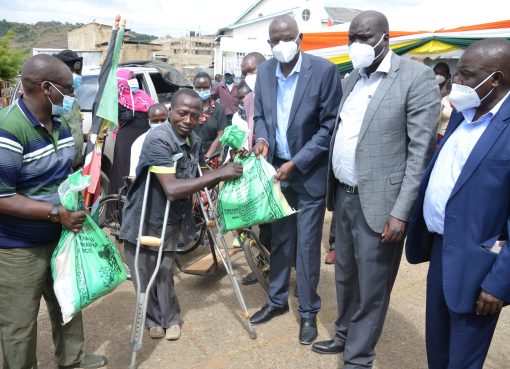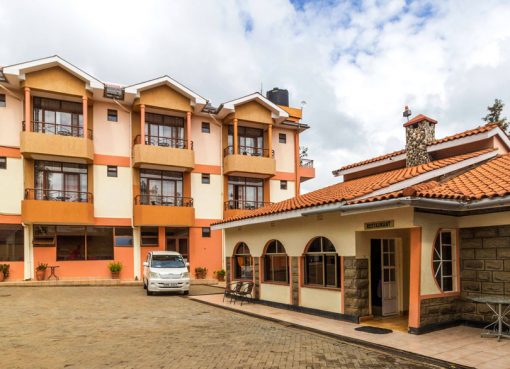The Nyandarua County Governor, Francis Kimemia, has expressed dissatisfaction over the census report released by the Kenya National Bureau of Statistics (KNBS).
Kimemia alongside his Bungoma County counterpart, Wycliffe Wangamati said that the results will be revised and if any mistake is detected, they will make an appeal.
He revealed that his County is already doing an internal analysis to determine the authenticity of the figures released regarding Nyandarua County population.
The interim report released, yesterday, estimated Nyandarua’s population at 638,289 being about two times the number of its registered voters.
“I’m in doubt about the census results since it shows that our numbers as a county have dropped drastically as compared to the previous census results ten years ago,” said, adding that factors such as drunkenness that hinder population growth are rare in his county.
“According to these results, it is a suggestion that each voters’ household in Nyandarua County has only one other individual, which is practically impossible,” added Kimemia.
In support, Wangamati said that his County too would do an analysis of the results so as to come into terms with the KNBS findings.
“We want to have a clear picture of how these figures were arrived at. We need a clear report of which sampling techniques were used to arrive at these figures,” said Wangamati.
According to the recent KNBS report, Bungoma County was fifth countrywide in terms of population with 1, 670, 570 people.
Governor Wangamati wondered that, “This report indicates that there has been an increase of only 300,000 people.”
“Bearing in mind that Bungoma County citizens pride themselves as the most fertile, then these figures are not properly justified,” he added hilariously.
This was during the Council of Governors’ conference sideline held at Lake Ol Bolosat Resort in Nyandarua County where delegates from different counties had converged to learn from Nyandarua’s exemplary performance according to World Bank.
“We are here to not only learn but also exchange ideas on better revenue management and allocation,” said Wangamati.
Meanwhile, the Mandera residents have threatened to challenge in court the 2019 census results, saying the outcome does not reflect the reality on the ground.
According to the census report released, Monday, the county had registered 882, 079 people compared to 1,200,000 in the 2009 census report.
The Mandera West registered 97,983, Banisa-152,043, Kutulo- 71,602, Lafey- 83,001, Mandera Central-156,623, Mandera East – 158, 586 and Mandera North – 142,241 people.
Ibrahim Robow, a resident living in Mandera town, noted the census results were important as it will determine distribution of nationally resources to counties.
He asked for an explanation by the KNBS why the figures had reduced drastically.
“We have not had any disaster that has claimed lives, we are aware in every household there are over 10 children and it defeats logic why the results indicated the population was on a downward trend, ” said Robow.
Robow noted some people had not been enumerated as they had travelled with their livestock to neighbouring Ethiopia and Somalia in search of pasture due to biting drought then.
Abdirashid Ahmed, a taxi driver wondered why the population had not increased within 10 years.
Ahmed cited discrimination and continued marginalization by the government and warned the region will not receive enough resources for development.
In the Huduma registration in August the entire county population was less than 400,000 people.
Governor Ali Roba, has also refuted the results and threatened to move to court for a fresh enumeration exercise.
In the 2009 Census area leaders moved to High court contesting the results.
The verdict has not been given by the High court to date.
At the same time, the People Living with Disability(PWDs) in Siaya have faulted the KNBS for failing to categorize them during the just released Census report.
Led by a former nominated Siaya Member of the County Assembly (MCA), Margaret Adhiambo Oketch, the PWDs, said that just as the report categorized Kenyans by gender, the People Living with Disability equally deserved to be classified and their numbers known.
Speaking to the media in Siaya town, Oketch said that there was need to classify the disabled and if possible, by the different types of disabilities they suffer from.
“Just as the intersex group were captured, there was need to categorize us and properly classify PWDs with their respective disabilities,” she said.
She said that failure to have the data on PWDS may affect those living with disability as they will lose out on the national cake.
Oketch said that it will be difficult for those who champion the rights of People with Disability to convince anybody to set aside funds for the marginalized group in the absence of data.
“It will be a tall order for leaders, both at the County and National levels to formulate policies and even fight for budgetary allocations for Persons with Disability without clear population data,” she said.
The just released provisional results indicated that Siaya County had a population of 993,000 people.
By KNA TEAM



